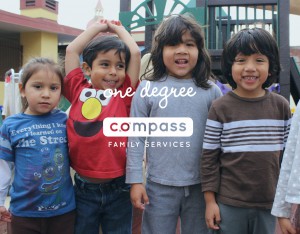
For a little over 100 years, Compass Family Services has worked to keep San Fr ancisco families sheltered and protected from the vicissitudes of the city’s rental market. Bringing much-needed technological innovation to social services, San Francisco-based non-profit One Degree utilizes web and mobile platforms to create “modern, tech-driven solutions to the problems that plague the safety net of social services and nonprofit organizations.”
ancisco families sheltered and protected from the vicissitudes of the city’s rental market. Bringing much-needed technological innovation to social services, San Francisco-based non-profit One Degree utilizes web and mobile platforms to create “modern, tech-driven solutions to the problems that plague the safety net of social services and nonprofit organizations.”
One Home, a joint effort by Compass Family Services and One Degree, provides state-of-the-art property search software designed to help potential renters find a place that can house their family and fit their budget. By combining their efforts, Compass Family Services and One Homes hope to help the Bay Area’s most vulnerable citizens find a safe, stable place to raise their children and get their lives back on track.
One Hundred Years of Service
San Francisco sits at the epicenter of the nation’s affordable housing crisis. A tech industry boom combined with the allure of coastal California living has tightened the housing market and left many inhabitants struggling to find a home. For the area’s more economically challenged denizens, the most recent influx of well-heeled home buyers and high-end renters have pushed monthly housing expenses to unheard of levels, leaving many on the brink of homelessness.
Dating back to the turn of the last century, Compass Family Services has dedicated its resources to assisting the city’s homeless and economically disadvantaged residents. With six programs serving more than 5000 parents and children each year, the organization’s tireless staff spends each day on the front lines of one of the nation’s tightest housing markets: the Bay Area.
Compass Family Services provides housing, education and employments services to at-risk families. With 50% of their clientele under the age of 18 – and 90% below the federal poverty line – Compass Family services is a vital sentinel in the fight against homelessness.
“Our mission is to help homeless families and families at imminent risk for homelessness to achieve housing stability, family well-being and self-sufficiency,” explains Compass’s Executive Director of Erica Kisch.
The organization’s main mission is to help these families achieve housing stability and self-sufficiently. Each year Compass provides over 12,000 shelter nights and places 95% of its families stable housing units, keeping them out of shelters and on the way to self-sufficiency. The organization’s 93 staff members – 20% of which were once homeless themselves – wield their paltry $8.3 million budget with the sharp exactitude of a master chef’s blade. They slice their meager dollars into the thinnest portions possible in order to provide their clients with shelter, counseling, housing referrals and more.
“The odds are so stacked against our clients that it’s often difficult for them to see their way out.”
No Room at the Inn
The Bay Area has always been one of the most desirable locations in the country due to its proximity to the Pacific Ocean, Napa Valley and world-renowned universities like Stanford and Berkeley. More recently, the Bay Area – along with its neighbors San Jose and Santa Clara – has emerged as the focal point of the tech boom. With Silicon Valley only 40 miles away and companies like LinkedIn and Yelp choosing to plant their headquarters in San Francisco, the city is currently awash with eager, (relatively) well-paid professionals looking to make a home in Northern California.
Unfortunately, this wave of prosperity has failed to uplift the area’s more helpless residents. Though the city has successfully moved almost 20,000 people off the streets and into affordable housing in the last decade, the net number of homeless individuals in and around San Francisco has stayed roughly the same for the last ten years – currently close to 6,500 adults and over 900 children.
San Francisco sits at the top of the nation’s list of per-capita spending on homelessness, doling out $165 million a year on homeless services. Half of those funds go directly to affordable housing support. As unlikely as it may seem, $80 million is a drop in the bucket when compared to available housing stock and average rents. These days, even San Francisco’s most humble neighborhoods are out of reach.
“It used to be that a homeless family came in and you could always get them a small unit in the Tenderloin they could afford,” said Kisch told the San Francisco Gate last year.
“I can’t even think of the last time we were able to house a family in the Tenderloin.”
Shrinking Opportunities
This increased demand and shrinking occupancy have been a boon to the folks that make their living off real estate and rental units, but at what cost? Doug Bibby, President of the National Multifamily Housing Council, warns in a recent Multi Housing News editorial, “High housing costs ultimately drain our cities and communities of the brains and brawn needed to thrive economically.”
“America is facing significant affordability challenges,” Bibby begins, going on to declare, “The apartment industry cannot afford to be a bystander in these debates over solutions to address the affordability challenge.”
The solution, according to Bibby is the creation of a new cooperative effort on the part of all of the industry’s players to “make affordability a priority.”
A Modern Partnership
The partnership between Compass Family Services and One Degree to create One Home exemplifies Bibby’s proposed solution to the country’s affordability crisis. By working together, these agencies have streamlined and simplified the housing search for the folks struggling to stay off San Francisco’s streets.
One thing Compass Family Services has learned from San Francisco’s tough housing market is how to wield the latest technology to help their clients find safe, stable accommodations. Working with One Degree has helped Compass quickly and efficiently find affordable housing options for their clients. These days there’s no need to search the classifieds, available rentals can be accessed with the click of a mouse.
“Paper listings work great,” comments Kisch, “but they’re sort of a thing of the past.”
For Rey Faustino, CEO, One Degree, working with Compass is a natural extension of the company’s main focus.
“For the last for years we’ve been working with families from across the Bay area and we’ve seen a huge need for affordable housing,” Faustino explains in a recent video highlighting the company’s work with Compass.
“Many of our members are just looking for a safe and stable place to call home. What we’re doing with one degree and with one home is taking the best technology and making that available for families all across the Bay Area.” It is saving those teetering on the edge – and pulling up the less fortunate who have already fallen through the cracks – that drives Erica Kisch and her staff.
“The housing market is so out of reach for so many families, even if they’re not the lowest of the low-income like our families are,” Kitsch lamented in an interview with the Institute for Children, Poverty and Homelessness.
“If our staff can’t afford to live in San Francisco, how can we expect our clients to live [here]?”
“This is the hardest place in the country right now if you’re looking for housing,” admits Kisch in the One Homes video. “The partnership with One Homes takes our housing search to another level.”


